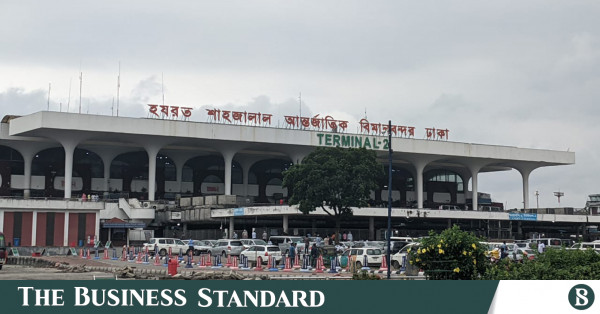The Civil Aviation Authority of Bangladesh (CAAB), Dhaka North City Corporation (DNCC), the Department of Environment, the Road Department, and the Bangladesh Road Transport Owners Association are responsible for enforcing the regulations that took effect on 1 October
Hazrat Shahjalal International Airport, Dhaka. File Photo: Zia Chowdhury/TBS
“>

Hazrat Shahjalal International Airport, Dhaka. File Photo: Zia Chowdhury/TBS
Despite the declaration of the area surrounding Hazrat Shahjalal International Airport in Dhaka as a “Silent Zone,” little has changed in reality.
The Ministry of Environment, Forest, and Climate Change, led by adviser Syeda Rizwana Hasan, announced the designation of the airport area and a 1.5-kilometer stretch from the airport (from Scholastica School to Hotel La Meridian) as a “Silent Zone” on 1 October as per the Noise Pollution Control Rules 2006, with violations potentially resulting in fines or imprisonment.
The Civil Aviation Authority of Bangladesh (CAAB), Dhaka North City Corporation (DNCC), the Department of Environment, the Road Department, and the Bangladesh Road Transport Owners Association are responsible for enforcing the regulations that took effect on 1 October.
However, field observations reveal a different reality.
Field Observations
Upon inspection, signage indicating the start of the “Silent Zone” was spotted at various locations, including in front of La Meridian Point in the south and on a steel pole along the footpath at Scholastica Point in Uttara. Yet, not a single vehicle was seen driving without honking.
During visits on Thursday night and Friday daytime, no drivers appeared to adhere to the regulations. Many continued to honk unnecessarily, especially buses and motorcycles, producing excessive noise levels. Observers noted a lack of enforcement or monitoring in the area.
Local Concerns
Residents, passengers, and business owners expressed frustration that the noise pollution situation has remained unchanged since the “Silent Zone” was implemented. “Drivers are honking for any reason and none,” a passenger noted. “Without law enforcement, this initiative cannot succeed.”
Passengers waiting on the main road near the airport confirmed the pervasive sound of horns. “Everyone, including buses and motorcycles, is honking unnecessarily,” one passenger said. “I haven’t seen any fines being enforced by traffic police.”
When questioned about the effectiveness of the silent zone, a security guard near the La Meridian Hotel admitted that honking has not decreased, and drivers continue to use their horns excessively.
Drivers’ Perspectives
Drivers defended their actions, claiming that honking is necessary for safety due to the chaotic traffic conditions in Dhaka. “People cross the road wherever they want, and without honking, accidents are more likely to happen,” Md Yusuf, a private car driver said.
They expressed skepticism about whether driving without honking was feasible. “Do they think we can drive without horns in this city?” another driver, Sujon asked.
When asked about the penalties for violating the horn ban, drivers were unsure of the specific fines.
Previous Initiatives and Research Findings
Previously, the Department of Environment announced 12 silent zones across Bangladesh, with five located in Dhaka, including the Secretariat, Agargaon, and the Parliament area. However, a recent study by the Center for Atmospheric Pollution Studies (CAPS) revealed that no silent zones in the country were effectively enforced.
The average noise level recorded in these areas was alarmingly high, with the Secretariat area averaging 79.5 decibels.
Professor Ahmed Kamruzzaman, head of the Environmental Science Department at Stamford University and CAPS chairman, emphasized the need for greater awareness among drivers, vehicle owners, and the public.
“If we can eliminate horns, we can reduce 60% of the noise pollution in Dhaka,” he said.
He acknowledged the current legal framework for noise pollution is weak.
Legal Framework
According to the Noise Pollution Control Rules 2006, residential areas should not exceed 45 decibels from 9pm to 6am and 55 decibels during the day.
In commercial areas, these limits are set at 60 and 70 decibels, respectively. Areas surrounding schools, hospitals, and places of worship are designated as silent zones up to 100 meters, with specific noise level restrictions.
Violations may result in up to one month of imprisonment or fines of up to Tk5,000 for first offenses, and for subsequent offenses, six months of imprisonment or fines of up to Tk10,000.
Air Vice Marshal Md. Monjur Kabir Bhuiyan, chairman of Civil Aviation Authority of Bangladesh (CAAB), said the successful implementation of this initiative relies on public awareness and cooperation from drivers and vehicle owners.
CAAB and the authorities at Hazrat Shahjalal International Airport are actively working to combat noise pollution and ensure the success of the “Silent Zone” initiative, he said.


